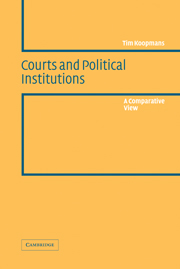Book contents
- Frontmatter
- Contents
- Preface
- Table of cases
- List of abbreviations
- 1 Introduction
- 2 The Sovereignty of Parliament
- 3 Judicial review of legislation
- 4 The growth of judicial power
- 5 The limits of judicial review
- 6 The legality of administrative action
- 7 Courts and governments
- 8 Courts and individual rights
- 9 Techniques of judicial protection
- 10 A glance at the future
- Select bibliography
- Index
6 - The legality of administrative action
Published online by Cambridge University Press: 26 February 2010
- Frontmatter
- Contents
- Preface
- Table of cases
- List of abbreviations
- 1 Introduction
- 2 The Sovereignty of Parliament
- 3 Judicial review of legislation
- 4 The growth of judicial power
- 5 The limits of judicial review
- 6 The legality of administrative action
- 7 Courts and governments
- 8 Courts and individual rights
- 9 Techniques of judicial protection
- 10 A glance at the future
- Select bibliography
- Index
Summary
The model of separation
From the viewpoint of comparative law, the existence, or absence of judicial review of legislation is certainly an important aspect of the position of the courts vis-à-vis the political institutions. Other elements of the constitutional system, however, may have a comparable impact on the politico-judicial relationship. It is to these other elements that we shall now turn.
I shall first examine judicial review of administrative action. In general, problems of administrative law are less spectacular than those that occasionally emerge in constitutional jurisprudence, but their influence should not be underestimated. First, judicial activities in this field raise some of the same questions as we encountered when looking at judicial control of constitutionality. Here also, a modest and hesitant beginning has progressively led to a more comprehensive review and to a more assertive tone of judgment. The theory and practice of the supervision of discretionary powers has already provided us with some examples. Secondly, administrative decisions are produced on a scale, and in a quantity, which have no parallel in legislation. Most people are more directly affected by the powers of government and its bureaucracy than by formal enactments. Frequently these powers have a direct bearing on the life and happiness of large numbers of citizens, for example administrative decisions concerning social security benefits, or the admission and expulsion of aliens, or granting or refusal of building permission.
- Type
- Chapter
- Information
- Courts and Political InstitutionsA Comparative View, pp. 129 - 161Publisher: Cambridge University PressPrint publication year: 2003



